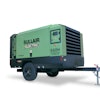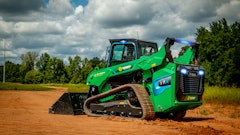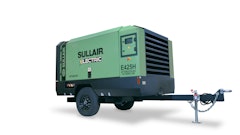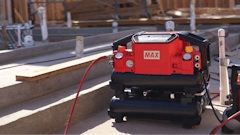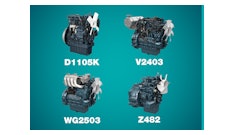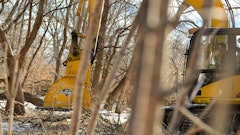
It’s the ultimate in flexibility, and it should be on your “watch list” for 2025. Dual-fuel engines can operate on both propane and another fuel source, like gasoline, allowing you to switch between the two depending on the project. Dual-fuel engines give contractors the ability to adjust based on their needs, fuel availability and price.
Here’s how it works: These engines have a system to seamlessly switch between fuel sources with a simple control knob. Some equipment comes equipped and marketed as “dual-fuel,” “bi-fuel” or “dual-powered” propane. As an internal combustion engine, users can expect the same power and performance they get from other fuels but with these key benefits:
1. Convenience
Propane is readily available across the U.S. and many contractors have propane cages or propane fueling stations on site at their yards, which makes it quick to refuel. Because propane tanks can be placed without extensive infrastructure, rural lots, jobsites or building locations can host propane, which is much easier to get than diesel, gasoline or natural gas.
Contractors are always on the go, and propane tanks are easily stored and transported in your truck or trailer. Propane is an easy option to keep with you because tanks are a closed system with low risk of spill. And, properly stored propane can stay in a tank indefinitely without losing potency or risking breakdown.
2. Sustainable Operation
Propane is significantly cleaner than gasoline, according to the Department of Energy, resulting in 13% or more greenhouse gas emissions. On the journey to net zero, propane equipment is a good choice for use in projects with sustainability requirements – and even better if you use renewable propane. Propane equipment is more pleasant for operators (no foul odors or exhaust fumes) and better for those with breathing difficulties.
[Resources: Propane and the environment | Alternative fuels data center ]
As a clean fuel, propane is also a stable source of power. As an organic compound it has few impurities, its chemical structure is resistant to oxidation and degradation. Plus, as a high-octane fuel, operators get excellent combustion control even in extremely hot or cold conditions. All of that adds up to less maintenance time and cost for the life of the equipment.
3. Conversion Kits
Contractors can also purchase conversion kits to add to existing gas-powered engines. These machines have fuel tanks, fuel injection systems, and fuel lines for both energy sources and to manage the mixing of propane with air for proper combustion. Conversion kits require some mechanical experience.
[ Resources: Dual-fuel propane system install | How does bi-fuel propane work? ]
Carburetor engines tend to be easier to convert than fuel-injected engines. Lawn mowers are a great piece of equipment to convert to propane, a major reason landscape contractors are often leaders in the use of propane and alternative fuels. With only a few hundred dollars in parts and a couple of hours, a simple mower engine can be converted to run from a propane cylinder. The conversion will equate to long-term fuel cost savings since a gallon of propane on average costs 30% less than gasoline.

